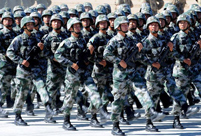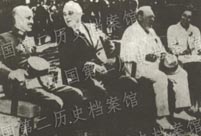 YOG kicks off in Nanjing
YOG kicks off in Nanjing
 Colorful life at Youth Olympic Village of Nanjing 2014 YOG
Colorful life at Youth Olympic Village of Nanjing 2014 YOG
 Royal Taoist temple to open to public
Royal Taoist temple to open to public
 Female soldiers at quake-hit area
Female soldiers at quake-hit area
 Shocking photos of cruel battles in Ukraine
Shocking photos of cruel battles in Ukraine
 Amphibious armored vehicle unit conducts open sea drill
Amphibious armored vehicle unit conducts open sea drill
 Water relay in Henan
Water relay in Henan
 Ethnic culture feasts eyes of travelers
Ethnic culture feasts eyes of travelers
 80 security dogs assembled in Nanjing police dog training base
80 security dogs assembled in Nanjing police dog training base
 Graffiti artists paint on street walls in Xinjiang
Graffiti artists paint on street walls in Xinjiang
China and the US have conducted in-depth discussions on the issue of anti-corruption at the Senior Officials' Meeting of the Asia-Pacific Economic Cooperation (APEC), and have expressed willingness to fight corruption together under the framework of a cooperative network, said Robert Wang, US Senior Official for APEC, at a press conference on Aug. 22 2014.
"Fighting corruption has always been high on APEC's agenda, but the amount of attention the issues has received this year surpasses every year in the past, and China has demonstrated leadership with regard to the issue," he said.
According to numbers released by China's central bank in 2011, corrupt Chinese officials who had fled the country had taken over 800 billion yuan (about $120 billion) overseas since the 1990s, presenting a huge challenge to the Chinese government in hunting the black sheep and retrieving the money.
In the recently concluded APEC Senior Officials' Meeting, relevant parties from the APEC Network of Anti-corruption Authorities and Law Enforcement Agencies (ACT-NET) convened for the first time. Experts say the network, the establishment of which was propelled by anti-corruption agencies in China, Indonesia, the US, and others, will facilitate the work of Chinese law enforcement authorities in their anti-corruption campaign.
"Since China became a member of the United Nations Convention against Corruption in 2003, all our anti-corruption work has been carried out under the general framework of the Convention, which has been subject to certain constraints posed by international laws and treaties, making cross-border corruption cases difficult to solve," said Zhuang Deshui, deputy director of the Center of Anti-corruption Studies at Peking University.
"Meanwhile, in the past, most of our anti-corruption agreements had been signed with developing countries, whereas in reality corrupt officials are more likely to flee to developed countries. This poses another institutional obstacle to our fight," he added.
Zhuang believes the point of the Network is to "control the man and retain the money".
"Previously, some Western countries believed China would impose the death penalty on corrupt officials, and therefore China's requests for extradition were turned down on human rights grounds. With the Network in place, however, we can share information with other countries and will be able to limit personal freedom once we detect any act of flight or transfer of assets."
"Specifically, according to the Network, we can ask the US, for example, to provide us support ranging from freezing the assets of corrupt officials who have taken flight, and restricting their personal freedom, to offering legal assistance. All of this will serve as a powerful disincentive to those who hope to get away with their misdeeds by fleeing overseas," Zhuang concluded.
This article is edited and translated from 中國(guó)與亞太國(guó)家聯(lián)手“海外反腐”, source: Beijing Youth Daily.
 Special holidays
Special holidays World's top 10 fighters
World's top 10 fighters 'Stewardesses' serve in hospital
'Stewardesses' serve in hospital Beautiful night scenery of Nanjing
Beautiful night scenery of Nanjing ‘Peace Mission -2014’ joint anti-terror military exercise kicks off in China
‘Peace Mission -2014’ joint anti-terror military exercise kicks off in China Eye-catching guides at the opening ceremony of YOG in Nanjing
Eye-catching guides at the opening ceremony of YOG in Nanjing A female missile launch company of PLA
A female missile launch company of PLA China, the U.S., Britain and the Soviet Union call for Japan's unconditional surrender
China, the U.S., Britain and the Soviet Union call for Japan's unconditional surrender Photo story: How a baby panda grows up
Photo story: How a baby panda grows up Star-leveled nursing home in a small county
Star-leveled nursing home in a small county Evidence of monstrous crime of Japanese invaders
Evidence of monstrous crime of Japanese invaders Foreign models compete with Chinese in Cheongsam show
Foreign models compete with Chinese in Cheongsam show The beautiful pictures of ancient Chinese architecture
The beautiful pictures of ancient Chinese architecture The Muslims involved in relief work
The Muslims involved in relief workDay|Week|Month